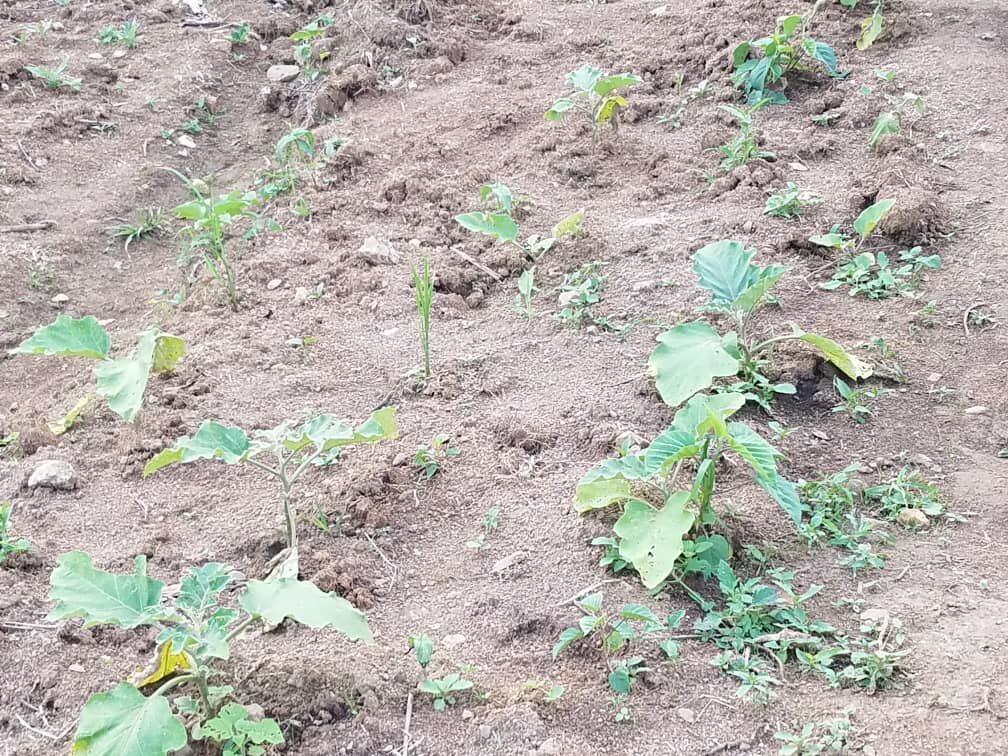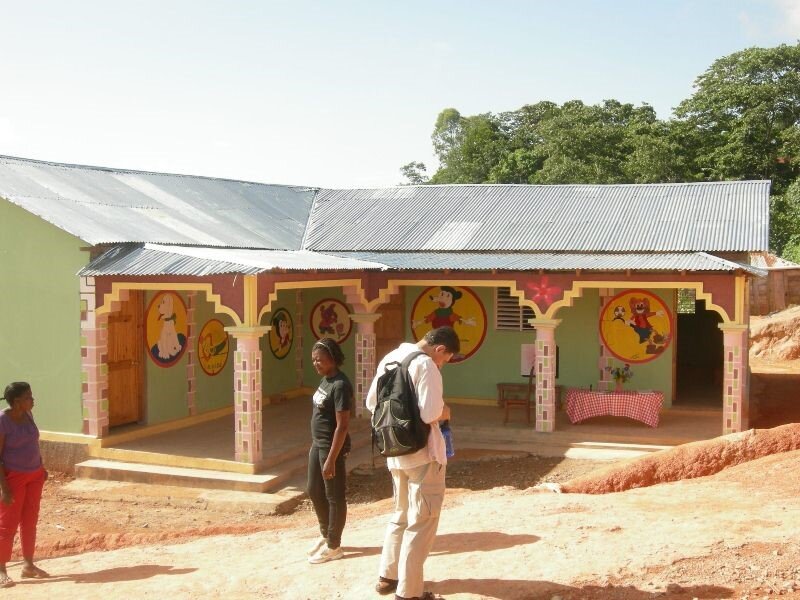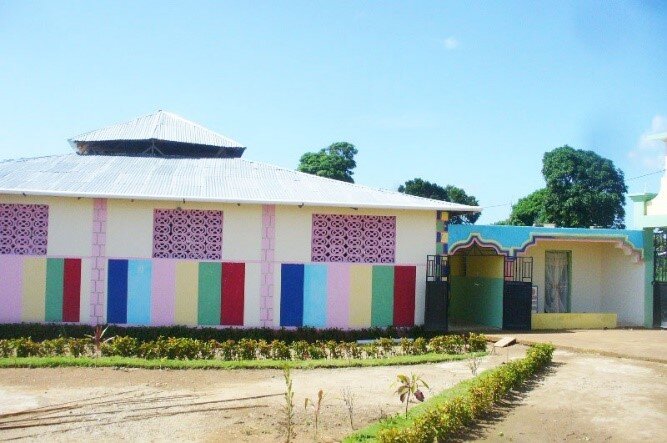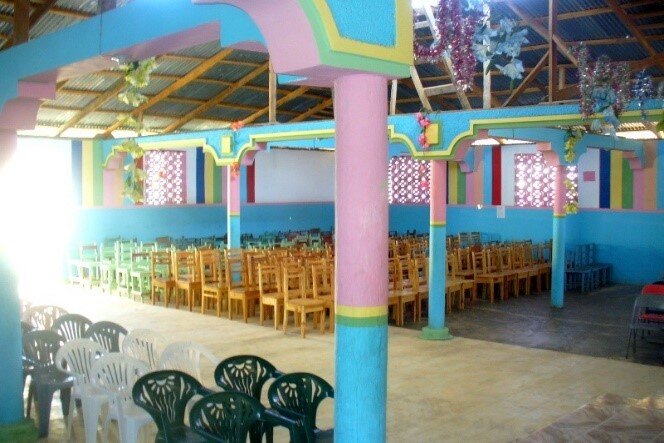Learn more on the projects…
Project “Survival from the COVID-19 virus”
The situation in Haiti is not good, both economically and politically.
The Covid virus has also affected Haiti. Fortunately, the cases of contagion and the number of deaths are below those of North America or other countries.
The contamination happens above all in places of contact with the Dominican Republic. This, unfortunately, is the case in the region where the majority of our activities take place.
We contribute protecting the population, above all our schools and the parishes, by establishing several places of sanitization and providing sanitizing material.
Sanitizing station and material
Adopt-a-garden





To counter the extremely difficult situation of many families in our communities in Haiti, due to the rapid lack of food because of the closure of the border with the Dominican Republic from where many food products are normally imported, another impact of COVID-19, the agricultural cooperative had this idea in order to instill a dynamic that would have a snowball effect and where people "take back their destiny". They launched the "Adopt-a-Bean-Plant" project, which we renamed "Adopt-a-Garden", to have small vegetable gardens close to the houses, to which the inhabitants would give special care, including water chores.
The expenses are estimated at $65 CAD per garden. The Haiti committee was particularly touched by this initiative and we have asked our friends and families to support this project. And from little shoots...we now have little vegetable gardens near the houses but also...fields that are growing and producing. The products are shared with the neighbour.
A focolarino is working closely with ours over there to understand what the needs would be to keep this initiative alive.
Adoptions at a distance








The sponsorship project of “adoption at a distance” started in 1996 in the Department du Nord-Est, the poorest in Haiti. The majority of people here live under the poverty line and many children are unable to go to school. The project consists in sponsoring a child, providing for his/her education and health care according to local standards.
It is funded by the NGO "Action for New Families ONLUS", an expression of the Focolare in Italy. Presently 150 children are being sponsored in Haiti, of which 30 are sponsored by North Americans, mostly Canadians. The people who sponsor a child are families, single people or organizations, who pledge $400 CAD a year for the child.
Wilfrid Joachin is the local coordinator of this project. Being Haitian, he knows his people well, and together with a few other people from the area, they are able to find the families that are most in need. Sometimes the sponsored child is the only one of the family that has the opportunity to go to school. Inasmuch as possible, these families in turn help other families in need. In this way, family helps one or two other families. This support is very beneficial for the region; it helps the people to gain courage in facing their many problems.
The program began with children of poor families who were in the 1st, 2nd and 3rd grade. Now, most of these children are about to finish high school. Together with their families, they have signed an agreement, which will enable us to continue this project: those who have finished their secondary education and find a job, commit themselves to giving 25% of their income towards this project, and will volunteer some of their time in one of the schools run by PACNE for two years.
Schools


Premières salles de classe

Premières salles de classe

Nouvelles salles de classe à Zilma

Nouvelles salles de classe à Mont-Organisé

Nouvelle école à Lacroix

Nouvelle école à Comba

Jardin d'enfants à Mont-Organisé
1996 marked the beginning of our schools in Haiti. Members of the Movement wanted to care for the education of the children who were unable to attend school in the village of Lacouève and started to give free lessons in writing and reading. Two years later the same experience was done in Mont-Organisé.
In 2008, AMU (Azione per un Mondo Unito – Action for a United World) Luxembourg, an NGO connected to the Focolare Movement, provided the funds for building two classrooms with cement blocks, for sewing machines, and material for the two classes of the trade school for girls in Zilma.
These capital funds provided an adequate infrastructure for these three schools. However, we still rely on donations from the friends of Haiti to cover the operating costs of the schools; the government does not subsidise them although they have been recognised and accredited. Approximately 2/3 of the operating expenses are covered by the parents of the students and 1/3 by donations. Our goal is that, one day, the school expenses will be covered wholly by the contribution of the parents. This depends largely on the economic situation of the region.
Children that are catholic are taught catechism according to the programs of their local parishes and diocese. It prepares them to receive the sacraments of Confirmation and Eucharist.
Since the founding of these schools, several classes have finished the 9-year cycle of elementary school and some of these students were able to attend high school. With the help of a grant, a few of the more gifted students were able to attend university. In the meantime, two other schools have begun in Comba and in Lacroix, always with the goal of giving poor children a chance to learn how to read and to write.
In 2010 AMU Luxembourg financed an even bigger project: construction of classrooms, meeting rooms, storage rooms, kitchen, toilets, enclosure, classroom furniture and equipment for the schools at Zilma and Mont-Organisé and for a Kindergarten at Mont-Organisé.
A couple of years later, a Volunteer of the Focolare Movement in Toronto, ML, was visiting our small community there and spoke about this initiative on her return to the members of the Movement in Canada. They raised some funds and sent them to Haiti. With this aid, the people in Haiti built some makeshift classrooms.
Support Bank
The founding members of the Support Bank back in 1991.
From left to right: Rev. Baltazar OMI, pastor, Wilfrid Joachin, Joseph Filusma, Génita Simoncoeur. Sr. Altagrâc, Étienne AMI, Sr. Agnès Lardanchet AMI
This project is designed to help the neediest people in the community. In the township of Mont-Organisé and its surroundings, there are groups of the Focolare Movement that meet regularly. They are the Word of Life groups.
Presently there are 26 such groups with a total of 980 participants, mostly youth. They discovered that there are people that are completely destitute in their communities, old and sick with nobody to care for them, or families where people are literally starving. Those who do not live in a town or village, live in huts scattered throughout the countryside, not always easily accessible.
The groups of the Focolare looked into this situation and are now in contact with 125 of these destitute and abandoned people. They support them out of their own resources and money, but most often by spending time with them wherever they live, to bring them to the hospital, to feed them, to clean them and to serve them in other concrete ways.
Scholarships
Some gifted young people, belonging to the focolare and being aware of the need for an improvement in agriculture and business, have started university studies. Too poor to pay for their studies, they were helped by the Focolare Movement in Canada and for the last few years by grants from the Basilian Human Development Fund (BHDF).
At the end of their studies, they would like to put their knowledge at the service of their country, above all in agriculture in order to help the numerous small farmers to produce food in a more efficient way. Two of the students that are about to finish their studies have planned to spend their time and knowledge not only in office, but also in the field, with the farmers.
Housing for the poor

Exterior view of the Housing Center

The Housing Center with its rooms and hall

Exterior view of the Housing Center

The hall of the Housing Center
The project for a housing center in Savanette (Mont-Organisé) was proposed by the members of the Focolare in Haiti in December 2009. It was meant to provide housing for Haitians living in poverty, abandoned and in need of daily care. They planned to raise funds for this project from their own resources and to ask the civil and religious authorities for donations. The land had been given to the organizers of the project some years earlier.
The earthquake of January 12th, 2010, changed everything. Port-au-Prince was at the epicentre of a disastrous earthquake and many of its residents fled to the countryside. Over 380 arrived in Mont-Organisé and more than 700 in Carice, a neighbouring town, asking for help. Some of these had relatives and friends to whom they went; others had no one to turn to. It was clear that the project had to be expanded. Thankfully, international aid arrived, particularly from AMU Italy, allowing the construction to start. With construction underway, the organizers decided to enlarge the hall that is part of the center to a capacity of 500. It provided us with a very nice facility for our summer Mariapolis; last year was the first time it was used for this purpose. The complex is now composed of 20 individual rooms, a large hall, a kitchen, a well, storage rooms, toilets and showers. The complex also houses the offices of PACNE.
Some people who had lost all their belongings in the earthquake were able to find help here, but have since returned to the capital. The people lodged in this project number about 15 so far; they are mostly people with some disability or families in very destitute conditions. People from the local community support the centre by cultivating the fields adjacent to the centre to produce food for its inhabitants, or in other concrete ways.
Repatriation shelter
The Focolare Movement is active in the northeastern part of Haiti, along the border with the Dominican Republic. Since poverty in Haiti is much higher than in the Dominican Republic, many Haitians cross the border illegally in search of work. They usually find work in the sugar cane plantations, in the construction business or as farm workers.
Political and cultural tensions exist between the two countries. The Dominican military repatriates many of these illegal migrants, often at the opposite place of their entry (sending them to Haiti through a northern crossing if they entered in the south or vice-versa). These migrants are returned to Haiti without being allowed to go back to their residence to gather their meagre belongings. Therefore, they are totally destitute. Every month several hundreds are returned in this way. Many are repatriated to Haiti near Mont-Organisé, where the Focolare Movement is active.
A few years ago, the town of Mont-Organisé built a shelter to provide a place for these migrants to stay for one or two days once they have come across the border. But the town has not the means of providing meals or money to help them return to their home village. People of the Focolare Movement have helped them spontaneously from their own resources by providing the most basic necessities: a mattress and food for a few days.
We contribute protecting the population, above all our schools and the parishes, by establishing several places of sanitization and providing sanitizing material.









